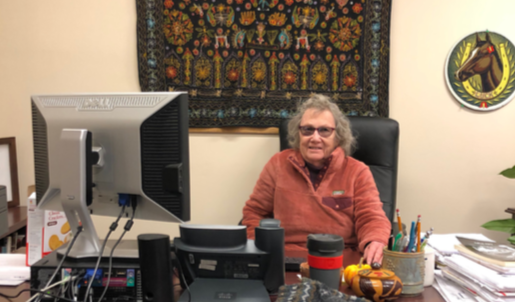By Anand Venigalla
Features Editor
Dr. Joan Digby, dean of the Honors College and a professor of English, won the Founders Award from the National College Honors Council (NCHC) during the 53rd annual NCHC Conference in Boston, from Nov. 7-11, 2018. Digby won the award for her work with Partners in the Parks, which grew out of “Partners in the Parks: Field Guide to an Experiential Program in the National Parks,” a monograph co-written with Heather Thiessen-Reilly and published in the NCHC Monographs series, now in its second edition.

“The Partners in the Park is a partnership with the National Park Service and what we do is we take honors students on one-week camping trips in the backcountry of parks like Grand Canyon, Bryce Canyon, all over the country,” Digby said. “The idea is for them to understand the value of preserving natural environments in this country, so students camp, they hike, they cook, canoe, everything you can do in a park setting.” Students also see wildlife, work with park rangers, and pay attention to the natural environments contained within America’s national parks.
Since Digby started the program in 2008, more than 1,500 honors students have participated. It is for this that the Council awarded Digby. “[T]hey felt that my leadership in this signature program (I originated it and got it started) was really important to the organization and especially to the students who went on these trips,” she said.
When Digby won the award, she felt “overwhelmed.” “The award has been only given out three times before, and it’s the highest award that they gave. I know the other people who have received it, and they were all big influences on my career in honors,” she said.
Digby gave an address after she won the award. Expressing gratitude towards Sam Schulman and Ron Brandolini for their friendship and influence in her life, she encouraged other honors educators to continue their work in the field. “After 40 years at LIU, I am still having fun. I write for our journals and serve on an editorial board. I am teaching a new course on drones and finding new ways to teach, invent, and enjoy working with honors students. Don’t leave. Change the model and stick with honors. Students—you too should think about professions that will bring you back to honors education as faculty or administrators,” she said.
“If honors education in some sense celebrates a Renaissance vision of humankind, Joan Digby is that image incarnate,” said Dr. Jeff Portnoy, co-chair of the NCHC Publications Board and editor of the NCHC Monograph series. “She is a scholar, an essayist, an editor, a poet, an adventurer in nature, a protector of wild camels, a woman of the horse, a publisher, a film producer, a provider of food and lodging for generations of cats, and a Founder of initiatives central to the heart of honors education and NCHC.”
John Lutz, chairman of the English, philosophy, and foreign languages department, sees this honor as a testimony to the power of a liberal education. “Dr. Digby’s testifies to the standards of excellence that she has pursued throughout her academic career. It underscores her commitment to the enduring ideals of the Liberal Arts and Sciences and points to the countless number of students who have benefitted from her nurturing spirit and care. It’s a reminder of the importance of the Humanities and the central role of dynamic and creative teachers like her in the success of the University,” he said.
Digby wants to empower students through education. “I want [my students] to come away with the idea that education empowers them to go out and do whatever they want to do and succeed at it. I especially want them to be able to speak, to write well, and know how to do research so that if people give them projects to work on, they’re very comfortable and self-assured,” she said. “I want to help them find their voice and their matured selves. To do that you have to be able to talk to people, you have to be knowledgeable and to be able to express the knowledge that you have, and to be self-confident, and that’s what I want them to take away.”
Digby finds the central feature of honors education to be its undergraduate research component. Every honors student writes an undergraduate thesis under the guidance of a faculty member.
“[T]hat whole process is the final step towards the rest of their lives,” she said. Digby feels that the research component allows for honors students to present some of their best work.
“I’ve got some fabulous theses coming up, and every student in the program presents the research to other students and faculty members in a colloquium, and when they do that and I hear the research that they’re doing, I’m sometimes awestruck by how brilliant they are and how terrific their work is. We’ve had many students publish their undergraduate work with their professors. Imagine what a leg-up that gives them,” she said.
Digby finds inspiration in Samuel Johnson as a figurehead of the 18th century, her field of interest, and as a human being. “[H]e was a powerhouse of publication in the 18th century in London which is my field, 18th century British [literature]. This guy single-handedly wrote a history and biography of all the poets who had ever written in English up to yesterday,” she said.
Digby did her Ph.D. work on Johnson at NYU. “I think the man is great; he’s just a great inspiration to anybody who wants to say ‘I can do that no matter what it is’ because that’s what he did, he did everything.”
“The other great thing about Samuel Johnson was that he had a cat whose name was Hodge. In his will, he left enough money for the cat to get oysters every day until the cat died. And the cat was taken care of by a servant of his who was black, who was a freed slave, and Johnson left him enough money to get his own house. So to me this is a human being. Everything about the man was compassion, everything about him appeals to me as a person that I admire.”
This semester Digby is teaching ENG 304-011: World Literature II, an honors core course, as well as ENG 2-015 Writing II: Research and Argumentation. Her interest in the 18th century, which she is teaching in ENG 304, stems from its focus on satire and comedy.
“[A] lot of the work written in that period was very biting and very comical, but I would not be still teaching if I did not have fun and if I could not play games in class. I really appreciate comedy and satire, and as you look at what is going on in this country right now, you can tell why cartoons and “Saturday Night Live” are popular, because they’re in the spirit of the 18th century,” she said.
“If Samuel Johnson were here right now, he would get rid of Trump really fast. And I just think we need to look around us and just see the corruption and the craziness, the complete craziness of it all, and learn how to take it on as satirists.”



Be First to Comment